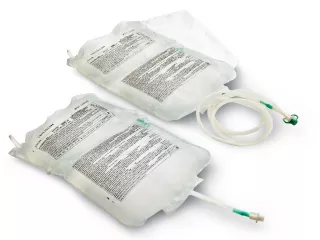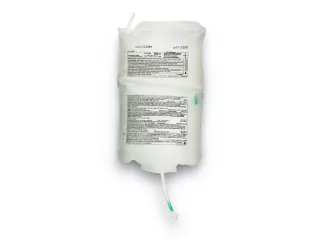
Physioneal PD Solution
Indications and usage
Physioneal is indicated whenever peritoneal dialysis is employed, including:
- Acute and chronic renal failure
- Severe water retention
- Severe electrolyte imbalance
- Drug intoxication with dialysable substances, when a more adequate therapeutic alternative is not available
Physioneal hydrogen carbonate/lactate based peritoneal dialysis solutions with a physiological pH are particularly indicated in patients in whom solutions based on lactate buffer only, with a low pH, cause abdominal inflow pain or discomfort.
Benefits of Physioneal PD solution
Bicarbonate/lactate-buffered PD solutions, such as Physioneal solution, have been shown to reduce infusion pain and may offer improved biocompatibility vs. conventional lactate-buffered solutions.2,3

Physiologic pH solutions, such as Physioneal solution, may help to preserve residual renal function (RRF).4
In a meta-analysis of published, randomised controlled trials/crossover studies from 1995 onwards, neutral-pH, low-GDP solutions such as Physioneal solution were associated with significantly greater RRF vs. conventional PD solutions.4,a
Bicarbonate/lactate-buffered solutions have been shown to reduce infusion pain vs. lactate-based solutions.2
In a prospective, randomised, double-blind crossover study of 17 patients across multiple centres, a bicarbonate/lactate-buffered solution produced lower recorded peak pain during infusion vs. a conventional low-pH lactate solution (P < 0.001), as assessed using a five-point verbal rating scale.2,b
In vitroc data have shown that Physioneal solution exhibited improved cell growth compared to a peritoneal dialysis fluid (PDF)-like control solution.3
In a Japanese in vitroc study, adjusting for the concentration of dextrose and glucose degradation products (GDPs), Physioneal solution was shown to inhibit L-929 fibroblast cell growth less than a PDF-like control solution (P = 0.008).3
Other commercially available solutions inhibited cell growth to the same extent or more than the PDF-like control solution.3,d Cell growth inhibition may be a prediction of in vivo toxicity.3
Physioneal for CAPD
For guidance on using Physioneal solutions in continuous ambulatory peritoneal dialysis, see our procedure guide.
Physioneal for APD
For guidance on using the Physioneal Clear-Flex bag for automated peritoneal dialysis, see our patient procedure guide
aStandardised mean difference [MD] = 0.17 mL/min; 95% CI = 0.01–0.32, and greater urine volumes (MD = 128 mL/day; 95% CI = 58–198). Greater RRF in the combined analysis of 11 studies including 643 patients, and greater urine volumes in the combined analysis of 8 studies including 598 patients, both with a follow-up period of 3–30 months.
bPain during infusion as assessed using a five-point verbal rating scale.
cIn vitro data may not translate into clinical outcomes.
dPlease note the PDF-like solution control has the following composition: 15 g (1.5%), 25 g (2.5%) or 40 g (4%) glucose, 5.4 g NaCl, 190 mg CaCl2, 51 mg MgCl2.6H2O, 9 g 50% DL-lactate. Other commercially available solutions were compared only with the PDF-like solution and were not directly compared with each other.
All authors of this study are employees of Vantive Health LLC.
Vantive, Physioneal and Clear-Flex are trademarks of Vantive Health LLC and its affiliates.
References
-
Vantive Health LLC. Physioneal Solution: A Physiologic PD Solution. Fact Sheet. 2019.
-
Mactier RA, Sprosen TS, Gokal R, et al. Bicarbonate and bicarbonate/lactate peritoneal dialysis solutions for the treatment of infusion pain. Kidney Int. 1998;53(4):1061-1067.
-
Dioos B, Paternot G, Jenvert RM, et al. Biocompatibility of a new PD solution for Japan, RegunealTM, measured as in vitro proliferation of fibroblasts. Clin Exp Nephrol. 2018;22(6):1427-1436.
-
Yohanna S, Alkatheeri AM, Brimble SK, et al. Effect of neutral-ph, low-glucose degradation product peritoneal dialysis solutions on residual renal function, urine volume, and ultrafiltration: a systematic review and meta-analysis. Clin J Am Soc Nephrol. 2015;10(8):1380-1388.
